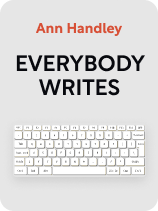

This article is an excerpt from the Shortform book guide to "Everybody Writes" by Ann Handley. Shortform has the world's best summaries and analyses of books you should be reading.
Like this article? Sign up for a free trial here.
What makes good writing? How do you determine the purpose of your writing? How much do creativity and accuracy matter?
In Everybody Writes, Ann Handley offers a comprehensive guide to writing in today’s business world. She shares three ingredients for good writing that involve attention to your audience, creativity, and credibility. This formula works for all kinds of writing, within or outside of business.
Read more to learn about these three elements of good writing.
What Makes Good Writing?
In the age of the internet, words (specifically, written words) are our means of connecting with the world and other people. What makes good writing? Handley says that good writing comes from the following three ingredients: its usefulness to your audience, its foundation in creativity or data, and its connection with your audience.
(Shortform note: In On Writing Well, William Zinsser also argues that good writing comes from three elements, but the elements he identifies are simplicity, clarity, and identity. While Handley also recommends simple and clear writing that conveys a unique voice or identity, she sees these as smaller elements that align more with general writing rules than with the main ingredients for high-quality writing.)
Handley emphasizes that if any of these is missing or insufficient, your writing won’t be high-quality. Let’s look at each ingredient in turn.
Usefulness to Your Audience
Handley points out that your writing must help your reader in some way. Your content should be clear and specific, and it should let your audience know what problem of theirs you’re going to solve.
Before you start writing, establish the purpose of what you’re writing by identifying 1) what you’re trying to accomplish, 2) what the main idea is, and 3) why it matters to your audience (also known as the “so what?” factor).
Grounding in Creativity and Data
In addition to being useful to your reader, your writing should be creative and factually accurate. According to Handley, writing that’s creative stands out more to the reader than writing that’s purely clinical because creative writing evokes emotions, which connect to readers more than rationality does. To evoke emotions, write so that your reader can see themselves reflected in your content. You can do so by telling your reader a story or appealing to their senses like sight and smell.
Handley particularly recommends using stories in your writing because these evoke emotions in your readers.
Done poorly, writing can also destroy a brand’s credibility. Because of this, she suggests that brands should hold themselves to higher standards of credibility even than journalists, embodying a devotion to truth, consistency, duty, and a willingness to share knowledge with everyone.
Connection With Your Audience
The final ingredient of great writing is a strong connection between your writing and the audience. Your writing must feel like it’s written by a human who relates to and understands the audience. Your writing should center around your audience.
Advocate for your audience and write to their needs. To do this, find out what your audience needs and wants, what’s important to them, and why they do what they do.

———End of Preview———
Like what you just read? Read the rest of the world's best book summary and analysis of Ann Handley's "Everybody Writes" at Shortform.
Here's what you'll find in our full Everybody Writes summary:
- Why there is no such thing as a bad writer
- A guide to improving your writing and reaching your audience
- How to adapt your writing to different formats while maintaining your voice






